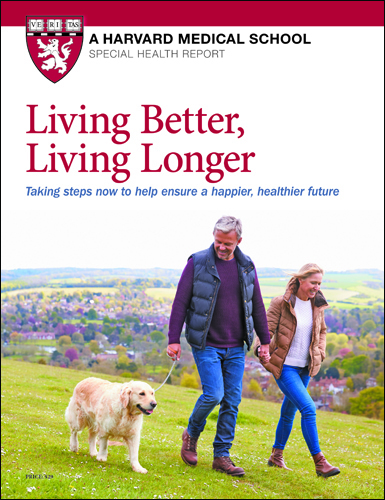Staving off heart problems in your 80s and beyond
Prevention and treatment strategies are similar to those for younger people, with a few added nuances and advice.

Older Americans are the fastest-growing segment of the population in this country — including the "oldest old," or people ages 85 and older. With advancing age comes an increased likelihood of health problems, including those affecting the heart. But does preventing and treating heart disease in octogenarians differ from what's recommended for younger people?
For the most part, the advice is very similar, says Dr. Patrick O'Gara, a cardiologist at Harvard-affiliated Brigham and Women's Hospital. "There's a clear benefit to treating high blood pressure, elevated LDL cholesterol, and diabetes in people in their 80s and older to lower their risk of heart problems," he says. As with younger people, medications are often required to meet recommended blood pressure and other targets. But lifestyle habits that lower heart-related risks should still be the central focus.
Stay active
Sticking to a program of regular physical exercise is probably the most important of those habits because it improves a range of risk factors, says Dr. O'Gara. Physical activity can improve your mood and the quality and duration of your sleep, which benefits heart health.
Walking or other activity that raises your heart rate helps to keep blood pressure in check. Exercises that strengthen your core (such as wall push-ups) can improve your balance and prevent falls. Among people 65 and older with coronary artery disease, the incidence of falls is 34%, compared with 12% in older adults without heart problems, according to one study.
Like falls, frailty — a syndrome marked by weakness, fatigue, and wasting — becomes more common with age. If you're frail or have been inactive for a while, see "Gentle exercises for older, frail people" in the September 2021 Heart Letter.
Medication adjustments
Another issue common in older adults is polypharmacy, defined as taking five or more medications. Around age 70, it's a good idea to review all your medications with your physician to see if any adjustments are warranted, says Dr. O'Gara. For example, many otherwise healthy people started taking a daily low-dose aspirin in middle age to ward off a heart attack. But once you reach age 70, the risk of bleeding may outweigh any protection against heart attack or stroke if no evidence of atherosclerosis exists. Bleeding can range from minor (such as bleeding gums or increased bruising) to more serious complications, including bleeding in the stomach, small intestine, and in rare cases, the brain.
Bleeding risk is also a concern for people taking anti-clotting medications, which are prescribed to treat atrial fibrillation, a heart rhythm disorder that raises the odds of stroke. Once you reach your 80s, it might make sense to lower the dose of your anti-clotting drugs to minimize bleeding risk. Weight loss and worsening kidney function, which sometimes occurs with age, affects the dosing of some of these medications.
Although current guidelines suggest aiming for a blood pressure reading of 130/80 or lower, that target might be too aggressive for some people in their 80s and older. "The older you are, the less forgiving your body becomes. That can leave you more susceptible to side effects such as dizziness or lightheadedness from blood pressure drugs," says Dr. O'Gara. If that starts happening to you, work with your doctor to dial back your dosage.
Intervention timing
Another consideration for octogenarians involves when to undergo an invasive heart-related procedure, such as aortic valve replacement. In the past, the general practice was to wait until a person's symptoms became so debilitating that quality of life suffered. But sometimes, waiting too long meant the person became so old and frail that valve replacement surgery was too risky. Now, a less invasive alternative—transcatheter aortic valve replacement, or TAVR — has become more widely available, which has expanded eligibility for older people. But there's also a growing trend to do TAVR sooner rather than later, at what Dr. O'Gara calls "the golden moment." That's the age at which a person will likely recover easily from the procedure and still have a good decade ahead.
Longevity advice
Dr. O'Gara has a few patients who are over 100, although one recently passed away at the age of 108. Aside from good medical care, is there anything special about these centenarians that contributes to their longevity? "They exercise, do volunteer work, and have access to other types of social activities and interactions that give them a sense of purpose and belonging in their community," says Dr. O'Gara.
Image: © Neustockimages/Getty Images
About the Author

Julie Corliss, Executive Editor, Harvard Heart Letter
Disclaimer:
As a service to our readers, Harvard Health Publishing provides access to our library of archived content. Please note the date of last review or update on all articles.
No content on this site, regardless of date, should ever be used as a substitute for direct medical advice from your doctor or other qualified clinician.
















